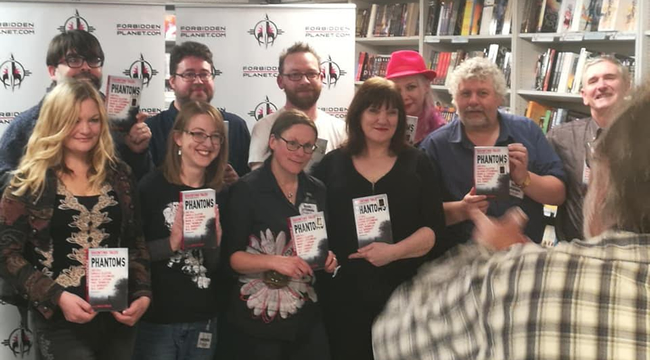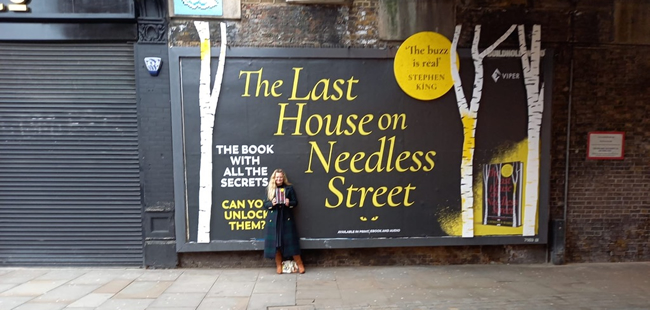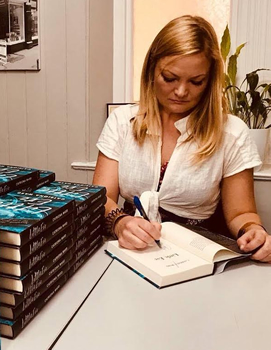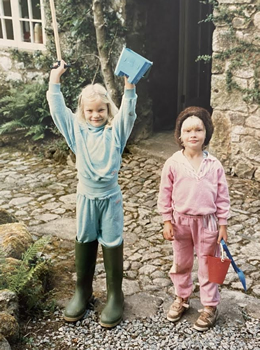

Up Close: Catriona Ward
‘The Darker the Tale, the Purer the Heart’
It doesn’t hit US bookstores until September 28, but Catriona Ward’s THE LAST HOUSE ON NEEDLESS STREET is already famously difficult to talk about. To avoid giving away any of its secrets, only a few things can be safely revealed: it’s a story about Ted, who lives in a ramshackle house on a dead-end street and might be a serial killer; Lauren, the young girl Ted is raising; Olivia, who loves the Bible, never leaves the house, and happens to be Ted’s cat; and Dee, a woman who thinks Ted has done something terrible to her younger sister, who vanished years ago during a family visit to a lake near Ted’s house.
Regardless of what he has or hasn’t done, Ted does not have an easy life. He spends his time either managing Lauren’s angry outbursts or worrying about the things he’s buried in the nearby woods. When Dee moves in next door and begins to infringe on his carefully guarded privacy, Ted’s already fragile existence begins to unravel, and there’s no doubt that something terrible is coming.
All of this is true, yet none of it divulges what the book is really about, or hints at the flayed-open hearts (figurative ones, probably) it will leave in its wake. Still, it’s the experience of the book that’s so difficult to convey. It’s grueling and horrific, but sometimes it’s sweet and funny. It’s harrowing and profoundly disturbing, but it’s also hopeful. It’s one of the most anticipated horror novels of the year, for good reason.
And it almost didn’t find a publisher. For that matter, it almost didn’t get written.
“I’ve never written a book where I was, on every page, not entirely sure if I could do it,” says Ward. “Not just the emotional content, but technically as well—all the different strands, and all the nested narratives within the Russian-doll structure. Every day I was like, ‘Can I actually do this?’ I remember saying to my agent, ‘I don’t know if I could do this.’ And she said, ‘I’d just like you to try.’”
The book didn’t start out as the audacious feat of storytelling it eventually became. When Ward first began tinkering with the idea, she meant to write a considerably more straightforward tale of a serial killer and his cat, largely inspired by Scottish murderer Dennis Nilsen’s affection for his dog, Bleep. “I think it’s such a gripping relationship,” Ward says. “This person who’s completely devoid of any actual moral, empathetic feelings somehow forges a really strong relationship… But it very quickly became evident that it was a book about something much, much larger than that.”
Exactly how much larger, though, is best left for the reader to discover as the story unfolds. Here’s where writing about the book, and interviewing Ward, gets tricky. NEEDLESS STREET still owes much to serial-killer lore; it’s no coincidence that it’s set in the Pacific Northwest, a region noted for its association with several high-profile murderers. True-crime enthusiasts will pick up nods to Bundy’s Lake Sammamish abductions, for instance, and Ward admits that calling her main character “Ted” was “a little bit naughty.” But even as it ticks many of the boxes of serial-killer fiction, it rips up the checklist and sets the pieces on fire.
“It is a difficult book to talk about,” Ward acknowledges. “My aim isn’t to pull the rug out from under the reader or to trick them. It should be a gradual unfolding of a pleasurable thing of connecting the clues. But I can say that the research I did changed my view of the world. … It made me see things differently, and I felt the book changed me as much as I created it, really.”
What can be revealed, though, is this: NEEDLESS STREET is profoundly moving and deeply humane, and while it deals with difficult, often disturbing subject matter, it never objectifies its characters or sensationalizes the horrors they endure. It’s an emphatic rebuttal of the myth that horror revels in suffering. Good horror, as Ward points out, does exactly the opposite.
“You can’t create horror without compassion,” she says. “It’s entirely predicated on it. These dark tales don’t come from an enjoyment of suffering. They come from being willing to be empathetic and enter into those places and really explore what people might be feeling in them. And that takes a lot of humanity, really. I did a panel at StokerCon and I remember saying, ‘The darker the tale, the purer the heart.’ And you know what? That is right. There’s a huge misconception about horror people being more inured to suffering and fear, whereas actually, we’re terrified of everything. And that’s why we can write it.”
***
As is so often the case with contemporary horror, we probably wouldn’t be here if it weren’t for Stephen King.
Ward connected with horror at an early age, when she read W. W. Jacobs’s classic short story “The Monkey’s Paw.” She was 13 years old, and she’d been having a profoundly frightening experience that she couldn’t explain. “I would just be on the verge of sleep,” she remembers, “and I would feel a hand in the small of my back, shoving me very firmly out of bed, and I would actually fall onto the floor. It was the most terrifying thing I think I’ve experienced before or since.”

Ward (front row, far left) at a launch event for the the 2018 anthology Phantoms, along with editor Marie O’Regan (front row, fourth from left) and fellow contributors (front row) Laura Purcell, Alison Littlewood, Robert Shearman, Mike Carey, (back row) Joe Hill, George Mann, Mark Latham, and AK Benedict. Photo credit: Steve Shaw
As a teenager in a pre-Google world, Ward had no way of knowing she was experiencing what’s known as a hypnagogic hallucination, a powerful sensory experience that occurs on the cusp of sleep. “I had obviously rolled myself out of bed,” she says. “But I could feel every single, individual finger in the small of my back—it was that vivid. I don’t believe in ghosts, and I’m not even sure I believed in them at the time. But I believed in that experience. And I still do—I believe very strongly in the importance and the significance of these experiences, partly because you never, ever, ever feel that kind of fear in your life.”
So when she came across “The Monkey’s Paw,” it was something of a lightbulb moment. “I just remember thinking this is where you put this; this is the architecture that will contain that beast. The feeling it gave me was exactly that, but it was controlled, and it was subject to the rules of plot and logic, which seemed like a huge relief. Horror can be quite cathartic and therapeutic in a sense that it provides a structure to cage these very dark, atavistic feelings, which life does not provide. Life is arbitrary—you suffer at will, really, and there are no rules or necessities such as character consistency to keep you straight. Whereas in books, you can order the universe inside the story to contain those fears.”

Ward during a desert research trip for her upcoming psychological thriller Sundial. Photo credit: Ed McDonald
That realization led to a lifelong love of horror and gothic literature, and King’s was one of the voices that guided Ward through the dark. After studying at Oxford and working for a while as an actor, she eventually wrote two critically acclaimed gothic horror novels: 2015’s Rawblood and 2018’s Little Eve. But while reviewers and awards committees were mightily impressed with those books, readers were a bit slower to catch on.
“Little Eve was well received—it won the Shirley Jackson—but I think it sold minus copies its first year,” Ward says. “I don’t even know how that’s possible, but apparently it did. [Publishing] is a business, and I sort of went to book jail for a little bit.”
So when it was time to take NEEDLESS STREET to editors, Ward and her agent had a daunting challenge: not only were they operating in the shadow of Little Eve’s commercial underperformance, but they also had a manuscript that seemed designed to confound marketing departments. How, exactly, does one sell a horror novel that can’t be talked about and is largely narrated by a cat?
“NEEDLESS STREET is an unshelvable book, in a lot of ways,” Ward says. “It’s in the middle of the Venn diagram of a lot of different genres. In the UK, they call it a Marmite book—you either hate it or you love it. And particularly some of the things that people respond to the most now—like the voice of Olivia, for instance—are things that really counted against it at the beginning.”
So much so, in fact, that Ward asked her agent to save all the “thanks, but no thanks” notes for what she came to call “Rejection Mondays.” But as perplexed as editors seemed after they’d read the manuscript, their feedback was even more frustrating for its author.
“It was kind of soul-destroying,” she says, “because all the reasons were very, very different. It’s very high concept, it’s very abstract, and it relies on a gee-dee talking cat. I think people didn’t know what to make of it. If there’s a cat in it, does that make it cozy? But also it’s very much not cozy at all. So I think people didn’t know where to place it.”
The book eventually found a home with Viper Books, a newly launched crime-fiction imprint of UK publishing house Serpent’s Tail. And while Viper got behind the book in a big way, Ward says reception to it was still “puzzled.” That is until Stephen King came into the picture.
While King remains a prolific writer, he seems to have embraced his role as the elder statesman of horror. The sales impact of blurbs is a matter of debate in the publishing world, but there’s little doubt that King’s endorsement can make all the difference for a new horror release. (Just ask Riley Sager, whose excellent 2017 breakout novel Final Girls took off in part after King called it “the first great thriller” of the year.)
“What changed its fortunes was Stephen King,” Ward says of NEEDLESS STREET. “He got an advanced reading copy and read it, which is obviously one of the biggest, most extraordinary moments of my professional life. And I still can’t quite get over it. And because it all happened in lockdown, in my living room, there was just this tiny possibility that I was making it all up.”
By the time NEEDLESS STREET’s US publisher, Tor Nightfire, announced the book was coming to the States, King had tweeted about it to his millions of followers, calling it “a true nerve-shredder that keeps its mind-blowing secrets to the very end.” Word of a movie deal followed a few months later, when Deadline broke the news that actor Andy Serkis and producer Jonathan Cavendish’s Imaginarium Productions had optioned the book for development as a feature. It’s all amounted to a truly life-changing experience for Ward.
“This time last year we were having Rejection Mondays,” says the author, who urges other writers to let go of the idea of writing a marketable book and just write the book of their heart. “I expected the book to be well regarded by three readers in Britain, and the thing is, I didn’t care. I just had to do it, and now the book’s been received beyond my wildest dreams. So I think the thing to do—what worked for me—is just, let go of the platonic ideal of a book that you think you should be writing and just write exactly the most harebrained, ambitious, deeply felt work you can produce. You’re never going to go wrong.”

Ward speaks at a signing event for her 2018 gothic horror novel Little Eve. Photo credit: Andy Lawrie
Thanks in part to the success of NEEDLESS STREET, Ward’s fans have much to look forward to. Up next is a psychological horror novel called Sundial, about a mother-daughter road trip where each thinks the other is plotting her murder, which Nightfire will release in March 2022. And in August, Viper announced that it had acquired two more books from Ward: Looking Glass Sound, about a failed writer who retreats to a secluded cottage to write his final novel, only to find that the house is possibly haunted by the subject of the novel, and a second, untitled thriller. No details have been released about that book yet, but based on Ward’s catalogue so far, one can make certain assumptions.
“One day, it would be absolutely wonderful to write a book in which nobody has a terrible time,” she says. “But that day is not today, you know?”
Home page photo credit: Ed McDonald
- Between the Lines: Rita Mae Brown - March 31, 2023
- Between the Lines: Stephen Graham Jones - January 31, 2023
- Between the Lines: Grady Hendrix - December 30, 2022







